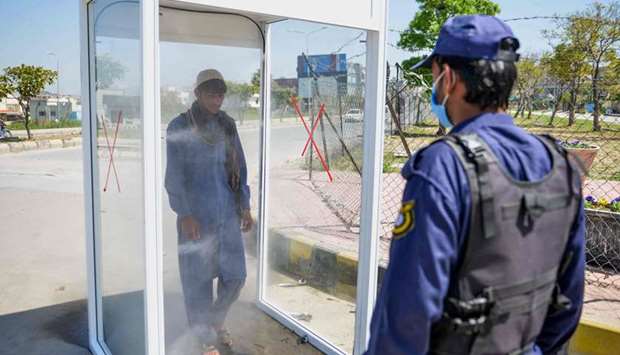The government has submitted to the Supreme Court a report on its national action plan for combating the coronavirus pandemic spreading across the country.
In its report, the government detailed the situation arising in the wake of the pandemic and the severity of suspected cases.
“By April 25, the number of the coronavirus cases are feared to reach 50,000,” the report stated at one point.
According to the breakdown provided in the report, around 7,000 cases of the total are expected to be critical in nature, while around 2,500 could be a cause for concern.
The government estimates that the remaining 41,000 cases could be of a mild nature.
The report notes that confirmed cases are expected to be lower than that of countries in Europe, and gave the assurance that the government is trying to maximise its testing capacity.
The federal government has said that it has put in place an emergency plan costing $366mn and guidelines have been prepared in consultation with medical experts.
“All the airports have special counters to monitor the coronavirus,” it mentions in the report, adding that around 222 suspected patients have been traced thanks to entry and exit point checking at airports.
The areas adjacent to Iran and along the Baluchistan border have declared an emergency to cope with incoming infected individuals, it says.
“Preparations were made to place patients in 154 districts under quarantine,” said the government report.
As of yesterday, Pakistan has recorded more than 2,700 cases and 40 deaths.
Meanwhile, the Islamabad High Court (IHC) has given the nod to turning three- and four-star hotels into “quarantine centres” by the National Disaster Management Authority (NDMA).
Last month the NDMA proposed to the government that hotels in all major cities across Pakistan be converted into quarantine centres for suspected and confirmed Covid-19 cases.
The coronavirus causes the Covid-19 respiratory disease.
With the federal government’s consent, the NDMA also issued directives on March 16 and March 28 to the management of various hotels to vacate the premises for the purpose.
The NDMA order to vacate the hotels was however challenged by three-star Hotel Margalla, situated in Islamabad, through Advocate Sikandar Bashir Mohmand.
IHC Chief Justice Athar Minallah observed that the federal government had taken various measures to prevent spread of the coronavirus, noting that the measures were to safeguard the public at large and their fundamental rights.
He observed that it is an extraordinary situation, and that it is settled law that the interest of public at large prevails over individual rights.
The petitioner contended before the court that the NDMA was not authorised to take such a decision, and that the government should utilise the places it owned rather than turning private properties into quarantine centres.
“Why does the government not use the prime minister’s home instead?” said the petitioner.
In response to the petitioner, Justice Minallah observed: “The government is taking measures for the protection of its people. How can the court interfere then? When it comes to protecting the people, the government can even use my home.”
The petitioner’s lawyer, however, argued that the fundamental rights could not be suspended even if a constitutional emergency had been invoked.
The lawyer said that hotel staff had been sent on leave since March 28 for an indefinite period due to the coronavirus outbreak.
Justice Minallah suggested that if the petitioner believed the decision would cause damage to hotels, he could make a claim later on.
The lawyer, however, could not convince the court.
The court, however, allowed the hotel to claim any damages if they wanted to be compensated, but at a later stage.
The court order read: “It is observed that in case the petitioner hotel suffers loss, it would not be without remedy because in such an eventuality remedies available under the law can be resorted to later.”
To contain the spread of deadly coronavirus, the NDMA had already converted many educational institutions and public halls such as the Expo Centres in Karachi and Lahore, the Pak-China Centre in Islamabad, hostels and even train coaches into makeshift quarantine centres.
Meanwhile, Azad Jammu and Kashmir (AJK) Prime Minister Raja Farooq Haider has inaugurated the first independent “Corona Isolation Hospital”, equipped with modern electro-medical apparatus and specialised staff.
The 50-bed facility has been set up in the newly-constructed building of Officers’ Club along Bank Road in Muzaffarabad, and would later be converted into a 100-bed cardiac hospital with angioplasty and angiography facilities.
Briefing Haider on the occasion, Dr Noman Manzoor Butt, co-incharge of the facility, said that it included intensive care and high-dependency units with six beds each, as well as seven single-bed and five double-bed isolation rooms and two isolation wards, with 10 beds each.
As many as 10 ventilators had initially been installed in the hospital, he said.
Dr Butt further informed the premier that the 86-member staff, including doctors and paramedics, had initially been detailed in the facility on a rotation basis and that the staff had been provided “complete safety kits”.
Speaking to reporters on the occasion, Haider asserted that the coronavirus situation was under control in AJK due to the “solid precautionary measures taken by his government”.

A security officer stands guard as a man walks through a disinfecting gate on a street in Rawalpindi.
